新概念英语2册课文及详解完美
(完整版)新概念英语第二册课文及翻译(最新整理)
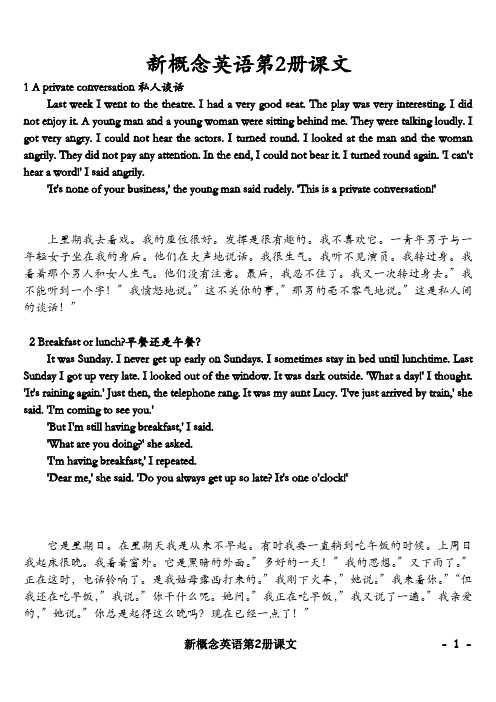
新概念英语第2册课文1 A private conversation私人谈话Last week I went to the theatre. I had a very good seat. The play was very interesting. I did not enjoy it. A young man and a young woman were sitting behind me. They were talking loudly. I got very angry. I could not hear the actors. I turned round. I looked at the man and the woman angrily. They did not pay any attention. In the end, I could not bear it. I turned round again. 'I can't hear a word!' I said angrily.'It's none of your business,' the young man said rudely. 'This is a private conversation!'上星期我去看戏。
我的座位很好。
发挥是很有趣的。
我不喜欢它。
一青年男子与一年轻女子坐在我的身后。
他们在大声地说话。
我很生气。
我听不见演员。
我转过身。
我看着那个男人和女人生气。
他们没有注意。
最后,我忍不住了。
我又一次转过身去。
”我不能听到一个字!”我愤怒地说。
”这不关你的事,”那男的毫不客气地说。
”这是私人间的谈话!”2 Breakfast or lunch?早餐还是午餐?It was Sunday. I never get up early on Sundays. I sometimes stay in bed until lunchtime. Last Sunday I got up very late. I looked out of the window. It was dark outside. 'What a day!' I thought. 'It's raining again.' Just then, the telephone rang. It was my aunt Lucy. 'I've just arrived by train,' she said. 'I'm coming to see you.''But I'm still having breakfast,' I said.'What are you doing?' she asked.'I'm having breakfast,' I repeated.'Dear me,' she said. 'Do you always get up so late? It's one o'clock!'它是星期日。
新概念英语第二册:第61课课文详解及语法解析
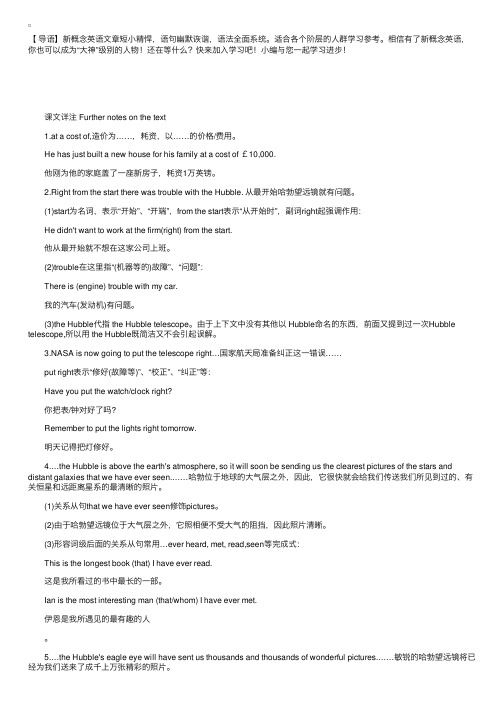
【导语】新概念英语⽂章短⼩精悍,语句幽默诙谐,语法全⾯系统。
适合各个阶层的⼈群学习参考。
相信有了新概念英语,你也可以成为“⼤神”级别的⼈物!还在等什么?快来加⼊学习吧!⼩编与您⼀起学习进步! 课⽂详注 Further notes on the text 1.at a cost of,造价为……,耗资,以……的价格/费⽤。
He has just built a new house for his family at a cost of £10,000. 他刚为他的家庭盖了⼀座新房⼦,耗资1万英镑。
2.Right from the start there was trouble with the Hubble. 从最开始哈勃望远镜就有问题。
(1)start为名词,表⽰“开始”、“开端”,from the start表⽰“从开始时”,副词right起强调作⽤: He didn't want to work at the firm(right) from the start. 他从最开始就不想在这家公司上班。
(2)trouble在这⾥指“(机器等的)故障”、“问题”: There is (engine) trouble with my car. 我的汽车(发动机)有问题。
(3)the Hubble代指 the Hubble telescope。
由于上下⽂中没有其他以 Hubble命名的东西,前⾯⼜提到过⼀次Hubble telescope,所以⽤ the Hubble既简洁⼜不会引起误解。
3.NASA is now going to put the telescope right…国家航天局准备纠正这⼀错误…… put right表⽰“修好(故障等)”、“校正”、“纠正”等: Have you put the watch/clock right? 你把表/钟对好了吗? Remember to put the lights right tomorrow. 明天记得把灯修好。
(完整版)新概念英语第二册:第7课课文详解及语法解析
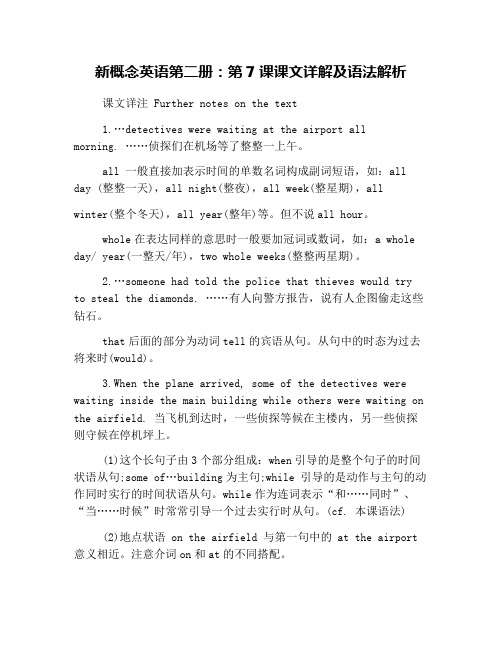
新概念英语第二册:第7课课文详解及语法解析课文详注 Further notes on the text1.…detectives were waiting at the airport all morning. ……侦探们在机场等了整整一上午。
all 一般直接加表示时间的单数名词构成副词短语,如:all day (整整一天),all night(整夜),all week(整星期),allwinter(整个冬天),all year(整年)等。
但不说all hour。
whole在表达同样的意思时一般要加冠词或数词,如:a whole day/ year(一整天/年),two whole weeks(整整两星期)。
2.…someone had told the police that thieves would try to steal the diamonds. ……有人向警方报告,说有人企图偷走这些钻石。
that后面的部分为动词tell的宾语从句。
从句中的时态为过去将来时(would)。
3.When the plane arrived, some of the detectives were waiting inside the main building while others were waiting on the airfield. 当飞机到达时,一些侦探等候在主楼内,另一些侦探则守候在停机坪上。
(1)这个长句子由3个部分组成:when引导的是整个句子的时间状语从句;some of…building为主句;while 引导的是动作与主句的动作同时实行的时间状语从句。
while作为连词表示“和……同时”、“当……时候”时常常引导一个过去实行时从句。
(cf. 本课语法)(2)地点状语 on the airfield 与第一句中的 at the airport 意义相近。
注意介词on和at的不同搭配。
《新概念英语》第二册课文、笔记
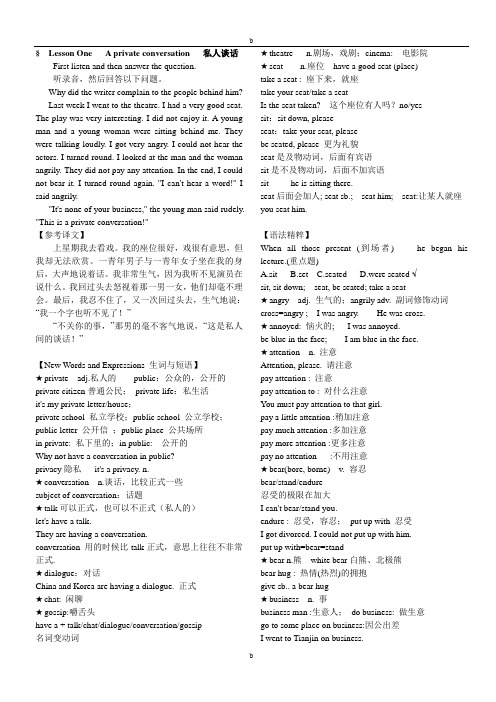
§Lesson One A private conversation 私人谈话First listen and then answer the question.听录音,然后回答以下问题。
Why did the writer complain to the people behind him?Last week I went to the theatre. I had a very good seat. The play was very interesting. I did not enjoy it. A young man and a young woman were sitting behind me. They were talking loudly. I got very angry. I could not hear the actors. I turned round. I looked at the man and the woman angrily. They did not pay any attention. In the end, I could not bear it. I turned round again. "I can't hear a word!" I said angrily."It's none of your business," the young man said rudely. "This is a private conversation!"【参考译文】上星期我去看戏。
我的座位很好,戏很有意思,但我却无法欣赏。
一青年男子与一青年女子坐在我的身后,大声地说着话。
我非常生气,因为我听不见演员在说什么。
我回过头去怒视着那一男一女,他们却毫不理会。
最后,我忍不住了,又一次回过头去,生气地说:“我一个字也听不见了!”“不关你的事,”那男的毫不客气地说,“这是私人间的谈话!”【New Words and Expressions 生词与短语】★private adj.私人的public:公众的,公开的private citizen普通公民;private life:私生活it's my private letter/house;private school 私立学校;public school 公立学校;public letter 公开信;public place 公共场所in private: 私下里的;in public: 公开的Why not have a conversation in public?privacy隐私it's a privacy. n.★conversation n.谈话,比较正式一些subject of conversation:话题★talk可以正式,也可以不正式(私人的)let's have a talk.They are having a conversation.conversation 用的时候比talk正式,意思上往往不非常正式.★dialogue:对话China and Korea are having a dialogue. 正式★chat: 闲聊★gossip:嚼舌头have a + talk/chat/dialogue/conversation/gossip名词变动词★theatre n.剧场,戏剧;cinema: 电影院★seat n.座位have a good seat (place)take a seat : 座下来,就座take your seat/take a seatIs the seat taken? 这个座位有人吗?no/yessit:sit down, pleaseseat:take your seat, pleasebe seated, please 更为礼貌seat是及物动词,后面有宾语sit是不及物动词,后面不加宾语sit he is sitting there.seat后面会加人; seat sb.; seat him; seat:让某人就座you seat him.【语法精粹】When all those present (到场者)____ he began his lecture.(重点题)A.sitB.setC.seatedD.were seated √sit, sit down; seat, be seated; take a seat★angry adj. 生气的;angrily adv. 副词修饰动词cross=angry ; I was angry. He was cross.★annoyed: 恼火的; I was annoyed.be blue in the face; I am blue in the face.★attention n. 注意Attention, please. 请注意pay attention : 注意pay attention to : 对什么注意You must pay attention to that girl.pay a little attention :稍加注意pay much attention :多加注意pay more attention :更多注意pay no attention :不用注意★bear(bore, borne) v. 容忍bear/stand/endure忍受的极限在加大I can't bear/stand you.endure : 忍受,容忍;put up with 忍受I got divorced. I could not put up with him.put up with=bear=stand★bear n.熊white bear白熊、北极熊bear hug : 热情(热烈)的拥抱give sb.. a bear hug★business n. 事business man :生意人;do business: 做生意go to some place on business:因公出差I went to Tianjin on business.★thing 可以指事情,也可以指东西It's my business 私人事情it's none of your business★rudely adv. 无礼地,粗鲁地;rude adj.【课文讲解】go to the theatre = see a film, go to the cinemago to the +地点表示去某地干嘛go to the dairy 去牛奶店go to the + 人+ 's 表示去这个人开的店go to the butcher's 买肉go to the doctor's 去看病go to school: 去上学go to church: 去做礼拜go to hospital(医院):去看病go home; I am at home.跟home相连一定表示没有事情可做,回家休息★enjoy, enjoy oneself:玩的开心enjoy+sth. : 喜欢, 从当中得到一种享受I like something very much. /I love something.I enjoy the music.★过去进行时态: 过去的某个时间正在发生的动作一个故事的背景往往用进行时态描述I+be+v(ing) were sitting :当时正座在The girl was reading a book in the garden. A boy came to her.★got : 变得, 表示一种变化I am/was angry 是一个事实I got angry: 强调变化过程got取代be动词, got是一个半联系动词, 可以直接加形容词说话的时候喜欢用缩略. I'm not, he isn't, they aren't写的时候会说: I am not, he is not, they are notI didn't do sth.., I did not do sth..★hear:听见;hear+人:听见某人的话I could not hear you. Beg your pardon?I couldn't hear you. /I couldn't hear a word. /I couldn't catch your words.I couldn't hear you clearly. /I couldn't catch your words. Beg your pardon? /I couldn't catch your words.★hear a word, a word 等于一句话hear a word of sb.. (actors)He didn't say a word.May I speak to Jim?/May I have a word with Jim?It's none of your business. /None of your business. /It's my business.★turn round:转头★pay (any) attention表示注意;对什么加以注意pay attention to sth.★This is private conversation!private : 私人的, 不想与别人共享【Key Structures关键句型】陈述句一定是有主语,有动词,有宾语,有句号;简单陈述句一定不能少的是主语、动词主语——>动词——>宾语——>状语1 ---主语一般有名词或代词构成2 ---谓语由动词充当3 ---宾语4 ---副词或介词短语,对方式或状态提问,往往做状语I like her very much5 ---地点状语6 ---时间状语可以放在句首或句末,先地点后时间I like the girl very much in Beijing last year.如果问何时何地,是一个固定搭配when and where【Multiple choice questions多项选择题】★pay attention: 注意(在思想上)notice: 注意(=see 眼睛看)★sitting behindbehind: 在...后面★in front of :在...前面(相对静止的概念)★before : 在...前面(+词、句子、一定和时间相连) ★above: 在...上面★ahead of: 在...前面(+时间、位置)(动态的行为) He arrived before six o'clock.Before he came backHe goes ahead of me.★特殊疑问词对后面的答案提问how(adv.) ——对一个方式、状态提问;对形容词、副词、介词短语提问where ——用介词,地点when ——用介词,时间why ——用because回答★any——用在否定句和疑问句中★some——用在肯定句中★none——没有任何东西、没有任何人None knows./None of us knows.★not any=nonot——否定词,要放在非实义动词后面He didn't pay attentionno——形容词、修饰名词I have no time./I don't have any time.★suffer:遭受,忍受(精神或肉体上)+痛苦bear: 忍受=standI suffer the headache.He often suffers defeat.§Lesson two Breakfast or lunch? 早餐还是午餐?First listen and then answer the question.听录音,然后回答以下问题。
新概念英语第二册:第46课课文详解及语法解析
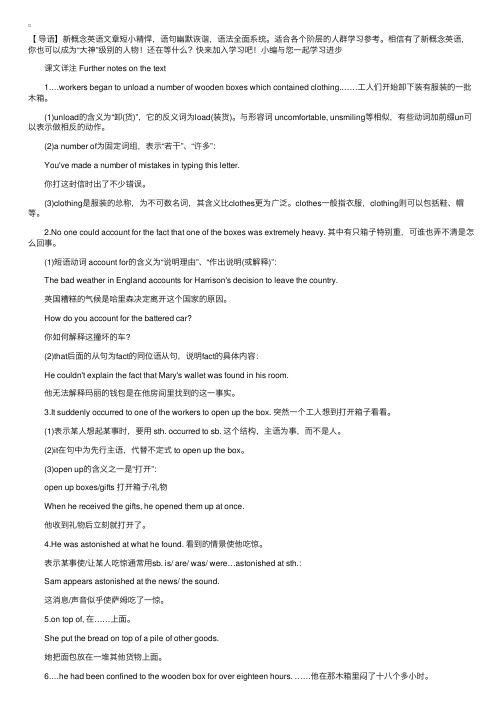
【导语】新概念英语⽂章短⼩精悍,语句幽默诙谐,语法全⾯系统。
适合各个阶层的⼈群学习参考。
相信有了新概念英语,你也可以成为“⼤神”级别的⼈物!还在等什么?快来加⼊学习吧!⼩编与您⼀起学习进步 课⽂详注 Further notes on the text 1.…workers began to unload a number of wooden boxes which contained clothing.……⼯⼈们开始卸下装有服装的⼀批⽊箱。
(1)unload的含义为“卸(货)”,它的反义词为load(装货)。
与形容词 uncomfortable, unsmiling等相似,有些动词加前缀un可以表⽰做相反的动作。
(2)a number of为固定词组,表⽰“若⼲”、“许多”: You've made a number of mistakes in typing this letter. 你打这封信时出了不少错误。
(3)clothing是服装的总称,为不可数名词,其含义⽐clothes更为⼴泛。
clothes⼀般指⾐服,clothing则可以包括鞋、帽等。
2.No one could account for the fact that one of the boxes was extremely heavy. 其中有只箱⼦特别重,可谁也弄不清是怎么回事。
(1)短语动词 account for的含义为“说明理由”、“作出说明(或解释)”: The bad weather in England accounts for Harrison's decision to leave the country. 英国糟糕的⽓候是哈⾥森决定离开这个国家的原因。
How do you account for the battered car? 你如何解释这撞坏的车? (2)that后⾯的从句为fact的同位语从句,说明fact的具体内容: He couldn't explain the fact that Mary's wallet was found in his room. 他⽆法解释玛丽的钱包是在他房间⾥找到的这⼀事实。
新概念英语第二册:第72课课文详解及语法解析

【导语】新概念英语⽂章短⼩精悍,语句幽默诙谐,语法全⾯系统。
适合各个阶层的⼈群学习参考。
相信有了新概念英语,你也可以成为“⼤神”级别的⼈物!还在等什么?快来加⼊学习吧!⽆忧考⼩编与您⼀起学习进步! 课⽂详注 Further notes on the text 1.The great racing driver, Sir Malcolm Campbell, was the first man to drive at over 300 miles per hour. 杰出的赛车选车马尔科姆·坎贝尔爵⼠是第⼀个以每⼩时超过300英⾥的速度驾车的⼈。
(1)to引导的不定式短语为 the first man的定语。
类似的可⽤于这种句型的词语有the second, the next/the last以及表⽰级的如 the best, the most intelligent等。
这些词语后⾯可以接名词或one(s),也可以不接: She's always the first to arrive and the last to leave. 她总是第⼀个来到,最后⼀个离开。
You're the best person to advise me about buying a house. 你是我买房⼦的顾问。
the only后必须接⼀个名词或 one(s): You're the only pereson/one to complain. 你是惟⼀抱怨的⼈。
(2)per表⽰“每⼀”、“每”,通常⽤于商业及技术⽤语,⽇常⽤语⼤多⽤ a/an: You can stay at the hotel at£ 10 per person per night. 你们可以每⼈每晚花10英镑住在这家旅馆。
You must have been driving at seventy miles an/per hour. 你刚才⼀定是以每⼩时70英⾥的速度开车。
新概念英语第二册课文及翻译
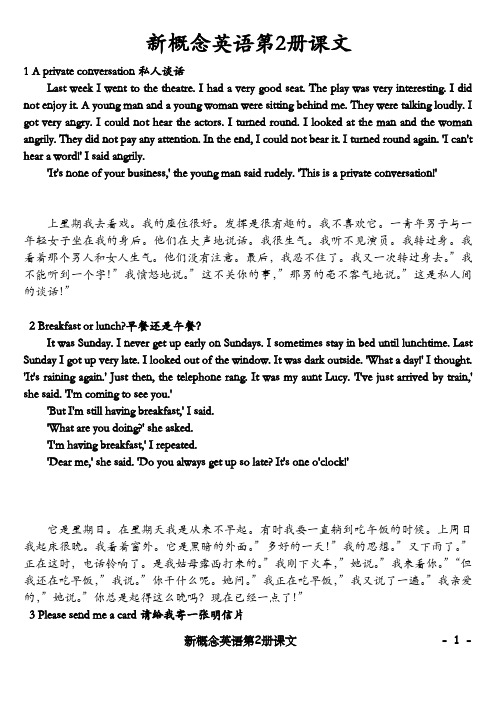
新概念英语第2册课文1 A private conversation私人谈话Last week I went to the theatre. I had a very good seat. The play was very interesting. I did not enjoy it. A young man and a young woman were sitting behind me. They were talking loudly. I got very angry. I could not hear the actors. I turned round. I looked at the man and the woman angrily. They did not pay any attention. In the end, I could not bear it. I turned round again. 'I can't hear a word!' I said angrily.'It's none of your business,' the young man said rudely. 'This is a private conversation!'上星期我去看戏。
我的座位很好。
发挥是很有趣的。
我不喜欢它。
一青年男子与一年轻女子坐在我的身后。
他们在大声地说话。
我很生气。
我听不见演员。
我转过身。
我看着那个男人和女人生气。
他们没有注意。
最后,我忍不住了。
我又一次转过身去。
”我不能听到一个字!”我愤怒地说。
”这不关你的事,”那男的毫不客气地说。
”这是私人间的谈话!”2 Breakfast or lunch?早餐还是午餐?It was Sunday. I never get up early on Sundays. I sometimes stay in bed until lunchtime. Last Sunday I got up very late. I looked out of the window. It was dark outside. 'What a day!' I thought. 'It's raining again.' Just then, the telephone rang. It was my aunt Lucy. 'I've just arrived by train,' she said. 'I'm coming to see you.''But I'm still having breakfast,' I said.'What are you doing?' she asked.'I'm having breakfast,' I repeated.'Dear me,' she said. 'Do you always get up so late? It's one o'clock!'它是星期日。
新概念英语第二册课文(中英文对照)
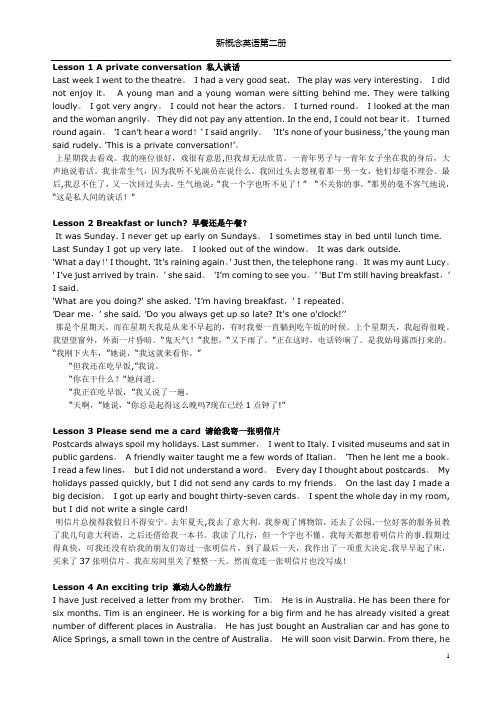
Lesson 1 A private conversation 私人谈话Last week I went to the theatre。
I had a very good seat. The play was very interesting。
I did not enjoy it。
A young man and a young woman were sitting behind me. They were talking loudly。
I got very angry。
I could not hear the actors。
I turned round。
I looked at the man and the woman angrily。
They did not pay any attention. In the end, I could not bear it。
I turned round again。
’I can’t hear a word!' I said angrily。
‘It's none of your business,’ the young man said rud ely. ’This is a private conversation!’。
上星期我去看戏。
我的座位很好,戏很有意思,但我却无法欣赏。
一青年男子与一青年女子坐在我的身后,大声地说着话。
我非常生气,因为我听不见演员在说什么。
我回过头去怒视着那一男一女,他们却毫不理会。
最后,我忍不住了,又一次回过头去,生气地说:“我一个字也听不见了!” “不关你的事,”那男的毫不客气地说,“这是私人间的谈话!"Lesson 2 Breakfast or lunch? 早餐还是午餐?It was Sunday. I never get up early on Sundays。
I sometimes stay in bed until lunch time. Last Sunday I got up very late。
新概念英语第二册课文及翻译
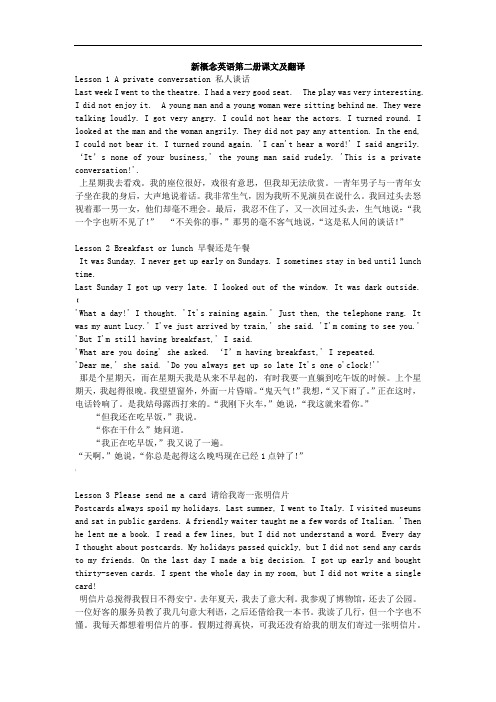
新概念英语第二册课文及翻译Lesson 1 A private conversation 私人谈话Last week I went to the theatre. I had a very good seat. The play was very interesting.I did not enjoy it. A young man and a young woman were sitting behind me. They were talking loudly. I got very angry. I could not hear the actors. I turned round. I looked at the man and the woman angrily. They did not pay any attention. In the end, I could not bear it. I turned round again. 'I can't hear a word!' I said angrily. ‘It’s none of your business,' the young man said rudely. 'This is a private conversation!'.上星期我去看戏。
我的座位很好,戏很有意思,但我却无法欣赏。
一青年男子与一青年女子坐在我的身后,大声地说着话。
我非常生气,因为我听不见演员在说什么。
我回过头去怒视着那一男一女,他们却毫不理会。
最后,我忍不住了,又一次回过头去,生气地说:“我一个字也听不见了!”“不关你的事,”那男的毫不客气地说,“这是私人间的谈话!”Lesson 2 Breakfast or lunch 早餐还是午餐It was Sunday. I never get up early on Sundays. I sometimes stay in bed until lunch time.Last Sunday I got up very late. I looked out of the window. It was dark outside.【'What a day!' I thought. 'It's raining again.' Just then, the telephone rang. It was my aunt Lucy.' I've just arrived by train,' she said. 'I'm coming to see you.' 'But I'm still having breakfast,' I said.'What are you doing' she asked. ‘I’m having breakfast,' I repeated.'Dear me,' she said. 'Do you always get up so late It's one o'clock!''那是个星期天,而在星期天我是从来不早起的,有时我要一直躺到吃午饭的时候。
新概念英语2课文解析
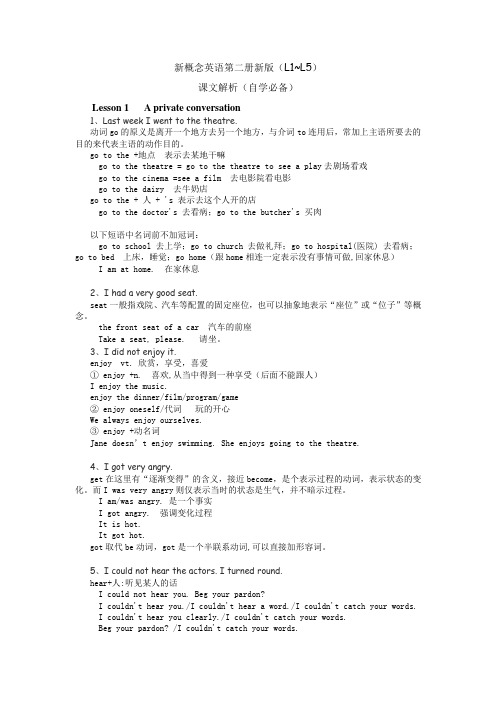
新概念英语第二册新版(L1~L5)课文解析(自学必备)Lesson 1 A private conversation1、Last week I went to the theatre.动词go的原义是离开一个地方去另一个地方,与介词to连用后,常加上主语所要去的目的来代表主语的动作目的。
go to the +地点表示去某地干嘛go to the theatre = go to the theatre to see a play去剧场看戏go to the cinema =see a film 去电影院看电影go to the dairy 去牛奶店go to the + 人 + 's 表示去这个人开的店go to the doctor's 去看病;go to the butcher's 买肉以下短语中名词前不加冠词:go to school 去上学;go to church 去做礼拜;go to hospital(医院) 去看病;go to bed 上床,睡觉;go home(跟home相连一定表示没有事情可做,回家休息)I am at home. 在家休息2、I had a very good seat.seat一般指戏院、汽车等配置的固定座位,也可以抽象地表示“座位”或“位子”等概念。
the front seat of a car 汽车的前座Take a seat, please. 请坐。
3、I did not enjoy it.enjoy vt. 欣赏,享受,喜爱① enjoy +n. 喜欢,从当中得到一种享受(后面不能跟人)I enjoy the music.enjoy the dinner/film/program/game② enjoy oneself/代词玩的开心We always enjoy ourselves.③ enjoy +动名词Jane doesn’t enjoy swimming. She enjoys going to the theatre.4、I got very angry.get在这里有“逐渐变得”的含义,接近become,是个表示过程的动词,表示状态的变化。
新概念英语第二册:第85课课文详解及语法解析
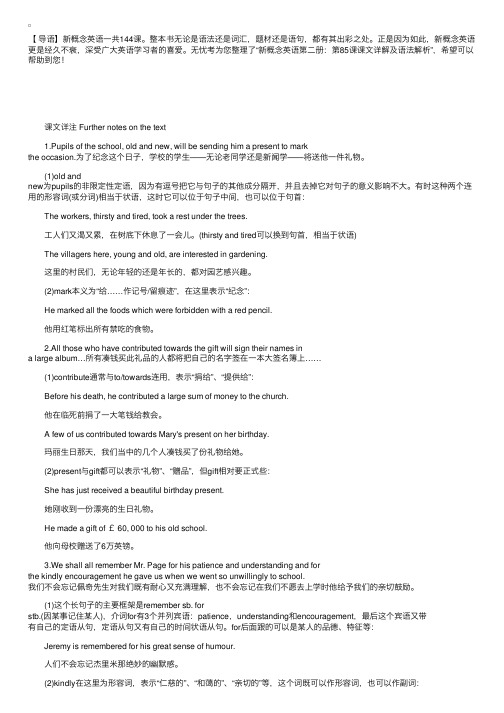
【导语】新概念英语⼀共144课。
整本书⽆论是语法还是词汇,题材还是语句,都有其出彩之处。
正是因为如此,新概念英语更是经久不衰,深受⼴⼤英语学习者的喜爱。
⽆忧考为您整理了“新概念英语第⼆册:第85课课⽂详解及语法解析”,希望可以帮助到您! 课⽂详注 Further notes on the text 1.Pupils of the school, old and new, will be sending him a present to markthe occasion.为了纪念这个⽇⼦,学校的学⽣——⽆论⽼同学还是新闻学——将送他⼀件礼物。
(1)old andnew为pupils的⾮限定性定语,因为有逗号把它与句⼦的其他成分隔开,并且去掉它对句⼦的意义影响不⼤。
有时这种两个连⽤的形容词(或分词)相当于状语,这时它可以位于句⼦中间,也可以位于句⾸: The workers, thirsty and tired, took a rest under the trees. ⼯⼈们⼜渴⼜累,在树底下休息了⼀会⼉。
(thirsty and tired可以换到句⾸,相当于状语) The villagers here, young and old, are interested in gardening. 这⾥的村民们,⽆论年轻的还是年长的,都对园艺感兴趣。
(2)mark本义为“给……作记号/留痕迹”,在这⾥表⽰“纪念”: He marked all the foods which were forbidden with a red pencil. 他⽤红笔标出所有禁吃的⾷物。
2.All those who have contributed towards the gift will sign their names ina large album…所有凑钱买此礼品的⼈都将把⾃⼰的名字签在⼀本⼤签名簿上…… (1)contribute通常与to/towards连⽤,表⽰“捐给”、“提供给”: Before his death, he contributed a large sum of money to the church. 他在临死前捐了⼀⼤笔钱给教会。
新概念英语第二册:第32课课文详解及语法解析
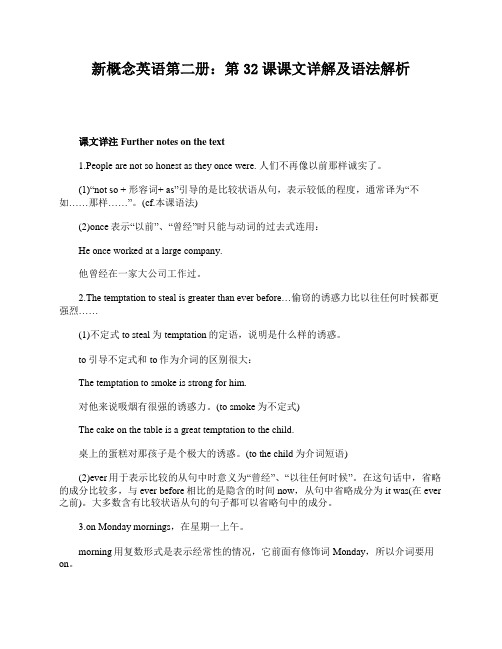
新概念英语第二册:第32课课文详解及语法解析课文详注 Further notes on the text1.People are not so honest as they once were. 人们不再像以前那样诚实了。
(1)“not so + 形容词+ as”引导的是比较状语从句,表示较低的程度,通常译为“不如……那样……”。
(cf.本课语法)(2)once表示“以前”、“曾经”时只能与动词的过去式连用:He once worked at a large company.他曾经在一家大公司工作过。
2.The temptation to steal is greater than ever before…偷窃的诱惑力比以往任何时候都更强烈……(1)不定式 to steal为 temptation的定语,说明是什么样的诱惑。
to引导不定式和to作为介词的区别很大:The temptation to smoke is strong for him.对他来说吸烟有很强的诱惑力。
(to smoke为不定式)The cake on the table is a great temptation to the child.桌上的蛋糕对那孩子是个极大的诱惑。
(to the child为介词短语)(2)ever用于表示比较的从句中时意义为“曾经”、“以往任何时候”。
在这句话中,省略的成分比较多,与ever before相比的是隐含的时间now,从句中省略成分为 it was(在 ever 之前)。
大多数含有比较状语从句的句子都可以省略句中的成分。
3.on Monday mornings,在星期一上午。
morning用复数形式是表示经常性的情况,它前面有修饰词Monday,所以介词要用on。
4.One Monday, there were fewer people in the shop than usual when the woman came in, so it was easier for the detective to watch her. 有一个星期一,当这位妇女走进这家商场时,里面的人比往常少,因此,侦探比较容易监视她。
新概念英语第二册课文及翻译
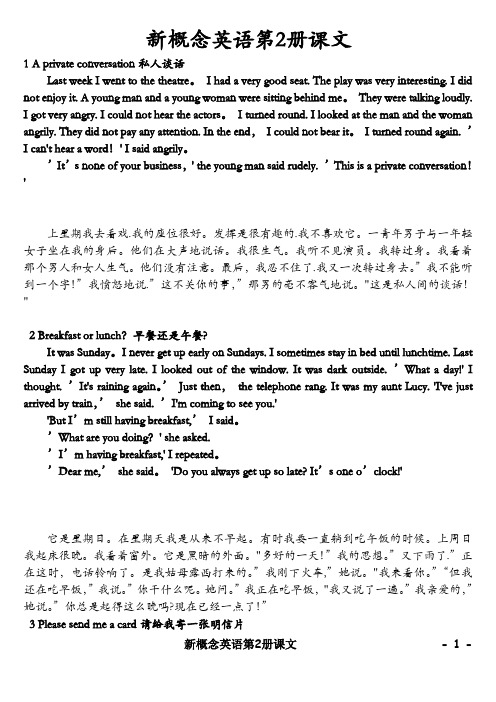
新概念英语第2册课文1 A private conversation私人谈话Last week I went to the theatre。
I had a very good seat. The play was very interesting. I did not enjoy it. A young man and a young woman were sitting behind me。
They were talking loudly.I got very angry. I could not hear the actors。
I turned round. I looked at the man and the woman angrily. They did not pay any attention. In the end,I could not bear it。
I turned round again. ’I can't hear a word!' I said angrily。
’It’s none of your business,' the young man said rudely. ’This is a private conversation!'上星期我去看戏.我的座位很好。
发挥是很有趣的.我不喜欢它。
一青年男子与一年轻女子坐在我的身后。
他们在大声地说话。
我很生气。
我听不见演员。
我转过身。
我看着那个男人和女人生气。
他们没有注意。
最后,我忍不住了.我又一次转过身去。
”我不能听到一个字!”我愤怒地说.”这不关你的事,”那男的毫不客气地说。
"这是私人间的谈话!"2 Breakfast or lunch?早餐还是午餐?It was Sunday。
I never get up early on Sundays. I sometimes stay in bed until lunchtime. Last Sunday I got up very late. I looked out of the window. It was dark outside. ’What a day!' I thought. ’It's raining again。
新概念英语第二册:第39课课文详解及语法解析
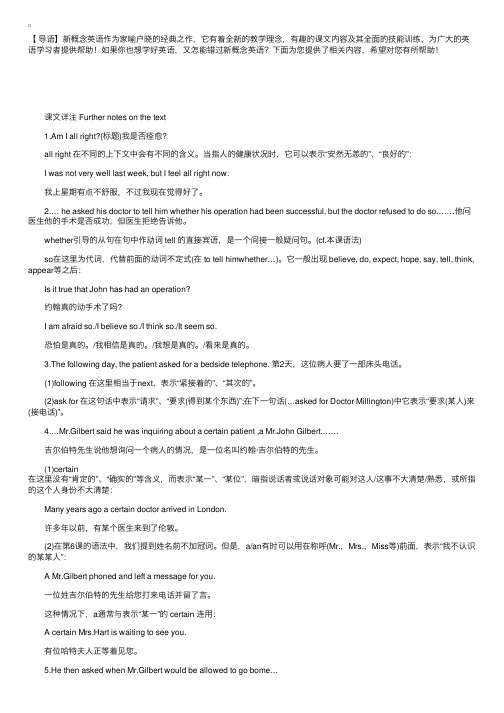
【导语】新概念英语作为家喻户晓的经典之作,它有着全新的教学理念,有趣的课⽂内容及其全⾯的技能训练,为⼴⼤的英语学习者提供帮助!如果你也想学好英语,⼜怎能错过新概念英语?下⾯为您提供了相关内容,希望对您有所帮助! 课⽂详注 Further notes on the text 1.Am I all right?(标题)我是否痊愈? all right 在不同的上下⽂中会有不同的含义。
当指⼈的健康状况时,它可以表⽰“安然⽆恙的”、“良好的”: I was not very well last week, but I feel all right now. 我上星期有点不舒服,不过我现在觉得好了。
2.… he asked his doctor to tell him whether his operation had been successful, but the doctor refused to do so.……他问医⽣他的⼿术是否成功,但医⽣拒绝告诉他。
whether引导的从句在句中作动词 tell 的直接宾语,是⼀个间接⼀般疑问句。
(cf.本课语法) so在这⾥为代词,代替前⾯的动词不定式(在 to tell himwhether…)。
它⼀般出现 believe, do, expect, hope, say, tell, think, appear等之后: Is it true that John has had an operation? 约翰真的动⼿术了吗? I am afraid so./I believe so./I think so./It seem so. 恐怕是真的。
/我相信是真的。
/我想是真的。
/看来是真的。
3.The following day, the patient asked for a bedside telephone. 第2天,这位病⼈要了⼀部床头电话。
(1)following 在这⾥相当于next,表⽰“紧接着的”、“其次的”。
新概念英语第2册课文
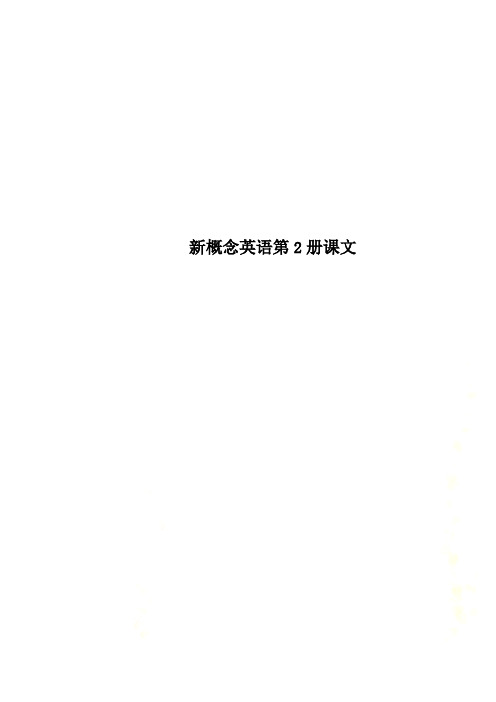
新概念英语第2册课文新概念英语第2册课文1 A private conversation私人谈话Last week I went to the theatre. I had a very good seat. The play was very interesting. I did not enjoy it. A young man and a young woman were sitting behind me. They were talking loudly. I got very angry. I could not hear the actors. I turned round. I looked at the man and the woman angrily. They did not pay any attention. In the end, I could not bear it. I turned round again. 'I can't hear a word!' I said angrily.'It's none of your business,' the young man said rudely. 'This is a private conversation!'上星期我去看戏。
我的座位很好。
发挥是很有趣的。
我不喜欢它。
一青年男子与一年轻女子坐在我的身后。
他们在大声地说话。
我很生气。
我听不见演员。
我转过身。
我看着那个男人和女人生气。
他们没有注意。
最后,我忍不住了。
我又一次转过身去。
”我不能听到一个字!”我愤怒地说。
”这不关你的事,”那男的毫不客气地说。
”这是私人间的谈话!”2 Breakfast or lunch?早餐还是午餐?It was Sunday. I never get up early on Sundays. I sometimes stay in bed until lunchtime. Last Sunday I got up very late. I looked out of the window. It was dark outside. 'What a day!' I thought. 'It's raining again.' Just then, the telephone rang. It was my aunt Lucy. 'I've just arrived by train,' she said. 'I'm coming to see you.''But I'm still having breakfast,' I said.'What are you doing?' she asked.'I'm having breakfast,' I repeated.'Dear me,' she said. 'Do you always get up so late? It's one o'clock!'它是星期日。
新概念英语第二册:第51课课文详解及语法解析
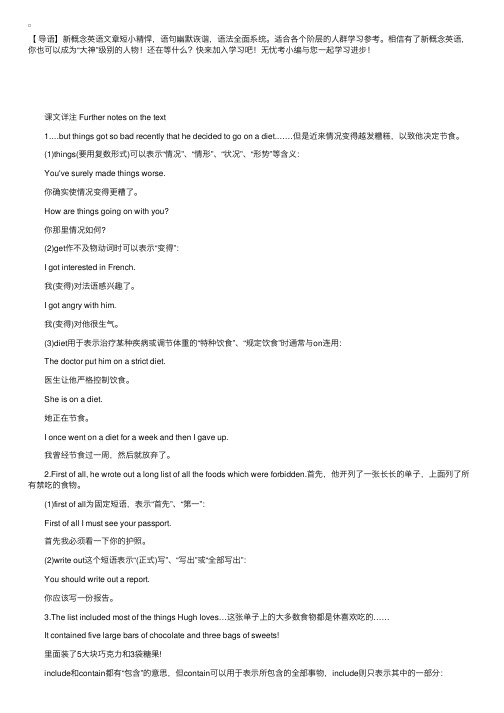
【导语】新概念英语⽂章短⼩精悍,语句幽默诙谐,语法全⾯系统。
适合各个阶层的⼈群学习参考。
相信有了新概念英语,你也可以成为“⼤神”级别的⼈物!还在等什么?快来加⼊学习吧!⽆忧考⼩编与您⼀起学习进步! 课⽂详注 Further notes on the text 1.…but things got so bad recently that he decided to go on a diet.……但是近来情况变得越发糟糕,以致他决定节⾷。
(1)things(要⽤复数形式)可以表⽰“情况”、“情形”、“状况”、“形势”等含义: You've surely made things worse. 你确实使情况变得更糟了。
How are things going on with you? 你那⾥情况如何? (2)get作不及物动词时可以表⽰“变得”: I got interested in French. 我(变得)对法语感兴趣了。
I got angry with him. 我(变得)对他很⽣⽓。
(3)diet⽤于表⽰治疗某种疾病或调节体重的“特种饮⾷”、“规定饮⾷”时通常与on连⽤: The doctor put him on a strict diet. 医⽣让他严格控制饮⾷。
She is on a diet. 她正在节⾷。
I once went on a diet for a week and then I gave up. 我曾经节⾷过⼀周,然后就放弃了。
2.First of all, he wrote out a long list of all the foods which were forbidden.⾸先,他开列了⼀张长长的单⼦,上⾯列了所有禁吃的⾷物。
(1)first of all为固定短语,表⽰“⾸先”、“第⼀”: First of all I must see your passport. ⾸先我必须看⼀下你的护照。
- 1、下载文档前请自行甄别文档内容的完整性,平台不提供额外的编辑、内容补充、找答案等附加服务。
- 2、"仅部分预览"的文档,不可在线预览部分如存在完整性等问题,可反馈申请退款(可完整预览的文档不适用该条件!)。
- 3、如文档侵犯您的权益,请联系客服反馈,我们会尽快为您处理(人工客服工作时间:9:00-18:30)。
NEW CONCEPT ENGLISH BOOK 2practice : 训练, progress : 进步If you practice more, then you can make great progress.五项综合训练技能listening : 听力speaking : 说话grammar : 语法 writing : 写作reading : 阅读translation : 译 knowledge +skillsLesson 1 a private con-versation★New Words and Expressions☆private adj.私人的如果妈妈想看你的信,你可以说:It's my private letter.如果陌生人想进你的房子,你可以说:It's my private house.private life 私生活由此引申出privacy n.隐私新东方是private school(私立学校),与此相反,公立学校是public school.所以,private的反义词是public.eg.public 公众;public letter 公开信;public place 公共场所private还有一个值得注意的意思:普通的。
如:private citizen 普通公民;private soldier 大兵我们熟悉的《拯救大兵瑞恩》就是《Private Ryan》☆conversation n.谈话have a + talk/chat/dialogue/conversation/gossip 名词变动词subject of conversation 话题。
(天气是英国人最喜爱的话题)They are having a conversation.几种谈话:talk 内容可以正式,也可以私人Let’s have a talk.conversation 一般用于正式文体中,内容上往往不正式dialogue 对话,可以指正式国家与国家会谈。
eg.China and Korea are having a dialogue.chat 闲聊,就是北京人说的“侃”,说的是无关紧要的事。
gossip 嚼舌头,说长道短用法:have a +...☆theatre n.剧场,戏剧[记忆]cinema 电影院☆seat n.座位这个词很重要,考试常考。
have a good seat,这里的seat指place,而不是chair。
take a seat/take your seat 坐下来,就坐下面这个句子在口语、电影里很常见:Is the seat taken?这个位置有人吗?请坐的3种说法:Sit down,please.(命令性)take your seat,please.Be seated,please.(更礼貌)考点:作为动词的seat与sit的区别sit--vi; seat--vtseat sb 让某人就坐When all those present___he began his lecture.(D)(重点题)A.sitB.setC.seatedD.were seatedA,B改为sat就对了☆angry adj.生气的cross=angry☆attention n.注意Attention,please.pay attention 注意pay attention to 对……注意pay a little/much/more/no attention☆bear(bore,boren)v.容忍忍受的几种说法:bear,stand,endure,put up withbear->stand->endure 忍受的极限在扩大put up with=bear=standbear n.熊give sb a bear hug 给某人热情(热烈)的拥抱☆business n.事,生意business man 生意人do business 做生意go to some place on business 因公出差business:某人自己的私人的事情thing:可以指事情,也可以指东西★TextLast week,I went to the theatre.I had a very good seat.The play was very interesting.I didn't enjoy it.A young man and a young woman were sitting behind me.They were talking loudly.I got very angry.I could not hear the actors.I turned round.I looked at the man and the woman angrily.They didnot pay any attention.In the end,I couldnot bear it.I turned round again."I can't hear a word."I said angrily."It's none of your business."The young man said rudely."It's a private conversation!"☆go to the+地点:表示去某地干嘛go to the cinema=see a filmgo to the +人+'s:表示去这个人开的店go to the doctor's 去看病go to the butcher's 买肉1go to the dairy(奶品店)go to +地点:去某地做相关的事go to school 去上学;go to church 去做礼拜;go to hospital 去看病go home 回家休息[注]跟home相连一定表示没有事情可做,休闲☆enjoyenjoy oneself 玩得开心enjoy+sth 喜欢(从中得到一种享受)(后面不能加人)I enjoy the music/book/dinner/film/program.☆过去进行时态:过去的某个时间正在发生的动作一个故事的背景往往用进行时态描述。
eg.The girl was reading a book in the garden.A boy came to her.☆got 变得I am/was angry.(是个事实)I got angry.(强调变化过程)got取代be动词。
got是半联系动词,可以直接加形容词。
☆说话的时候喜欢用缩略:I'm not,he isn't,they aren't写的时候会说:I am not,he is not,they are not☆hear:听见hear+人:听见某人的话I couldn't hear you.Beg your pardon?I couldn't hear a word.(夸张)I couldn't catch your words.a word 等于一句话eg.He didn't say a word.May I speak to Jim?=May I have a word with Jim?Lesson 2 Breakfast or lunch★New words and expressions☆until prep.直到后面加(时间状语)从句,前面就是主句区分“直到……才”(not until)和“直到……为止”(until)的方法:把until作为时间终止线。
从句的时间终点之前,这个动作做了还是没做?做了——肯定;没做——否定。
eg:For he___until it stopped raining.A.waitedB.didn't wait (A)A.leave.B.leftC.didn't leave (C)☆outside adv.外面(作状语)eg:He is waiting for me outside.☆ring(rang,rung)v.(铃、电话等)响[注]这种响是刺耳的,往往是提醒人做某事如:The telephone/door bell is ringing.而风铃等响要用jinglejingle(bell):(铃儿)响叮当v.给某人打电话:ring sbn.打电话:give sb a ringRemember to ring me.=Remember to give me a ring.n.戒指☆aunt n.姑,姨,婶,舅母所有长一辈的女性都用这个称呼与此相同,男性则是uncle他们的孩子:cousin:堂兄妹(不分男女)cousin的孩子:nephew:外甥,niece:外甥女[记:“捏死”]★TextIt was Sunday.I never get up early on Sundays.I sometimes stay in bed until lunch st Sunday,I got up very late.I looked out of the window.It was dark outside."What a day!"I thought.It's raining again.Just then,the telephone rang.It was my aunt Lucy."I've just arrived by train."she said."I'm coming to see you.""But I'm still having breakfast."I said."What are you doing?"She asked."I'm having breakfast."I repeated."Dear me!"She said."Do you always get up so late?It's one o'clock."☆look out ofout of是固定搭配☆感叹句What+a/an+adj+n+主语+谓语省略:1.主、谓随时可省eg:What a good girl (she is)!2.省形容词[注]有上下文和一定的语境,才能省略形容词。
